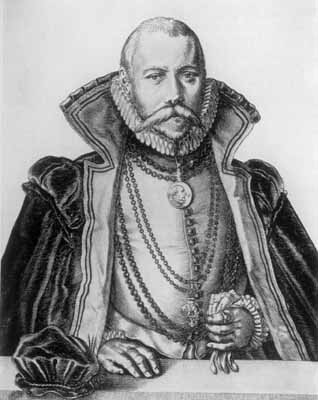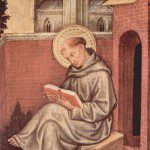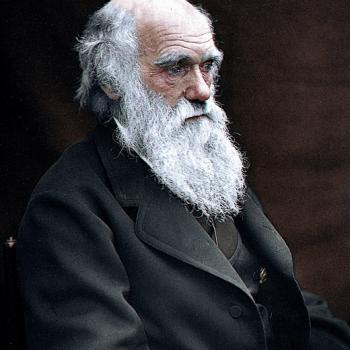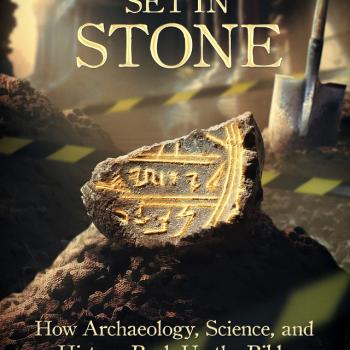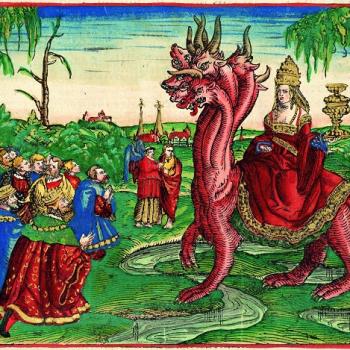Tycho Brahe (1546-1601): brilliant astronomer and also a geocentrist and astrologer [public domain / Wikimedia Commons]
***
(5-25-06)
***
I love this particular subject matter (beyond my keen interest in the whole science and religion discussion) because I especially enjoy (as an apologist) doing the following two things:
1) demolishing historical or philosophical or theological or exegetical myths and errors,
and:
2) documenting that the actual truth of virtually any given historical matter is invariably more complex and interesting than the black-and-white, warmed-over, half-baked and half-truth myths that we are constantly fed in the mass media, educational institutions, and even in movies, television documentaries and so forth.
One of the most cherished myths of our secular culture is “Religion (Christianity) vs. Science” or “Reason vs. Faith” or “Science vs. the Bible” as if the two things are inexorably opposed, by their very nature. They are not at all, of course. And this is obviously the case, since science deals with physical matter and the causative laws affecting it, whereas religion deals primarily with non-material things such as ethics, soul, spirit, God the spirit, love, faith, and so forth (not to mention the historical fact that modern science arose in explicitly Christian-Catholic western European culture; arguably would not have developed otherwise, and that almost all the early great scientists were Christians of some sort).
In other words, basically, it is an “apples and oranges” scenario. The two (both rightly-understood) need not clash at all; there is no necessity whatsoever for there to be any earth-shaking conflict (and there usually isn’t). Galileo got it right when he said that “the Bible teaches us how to go to heaven; not how the heavens go.” That’s as good of a brief summary as anyone could give on the subject, I think. Science is science; theology is theology. Is this not obvious? There is overlap, of course (as there is between religion and philosophy), but they are two essentially different fields of study or belief, in aims, subject matter, and methods.
Since the Renaissance, however, and the advent of (Baconian, Copernican, Newtonian) modern science and scientific method as a (rightly) cherished vehicle for arriving at truths concerning the laws of nature and this world and the universe, for some reason, a certain type of secular, skeptically-inclined, usually religiously nominal or liberal mindset, including many (but not all, by any means) scientists want to keep the old “religion vs. science” false dichotomy going, for whatever reasons. Sometimes it is largely a reaction against the ongoing “creation vs. evolution” controversy.
Other times, it is an obsessive dwelling on one-time historical errors such as the Galileo fiasco or some of the nonsense which went down during the initial reaction to Darwin’s Origin of Species, or the notorious Scopes Trial of 1925. Certain tiny, fringe factions on the Christian side have also adopted an “anti-science” or “know-nothing” attitude as well, which does no good. Impressions formed by the incessant trumpeting of these unfortunate events apparently have a staying power for those otherwise inclined to question Christianity and the biblical revelation. Stereotypes thus arrived at have a dismaying influence over minds and serve a purpose of minimizing strains of thought (intellectually respectable Christian theology and faith) which are deemed by certain folks as (intellectually) retrograde, undesirable, indefensible, and excessively or completely irrational.
Part of the larger myth here considered is the notion of a sort of black-and-white dichotomy, as if the scientists in any given conflict with religion or faith (e.g., Darwin and Galileo), were these rationalistic, reasonable always-objective, solely truth-seeking machines, so to speak, whereas those on the Christian “side” were invariably dogmatic, closed to reason and inquiry and scientific observation, and indeed, opposed to same (hence we hear about the few Catholic throwbacks who refused to peer into Galileo’s telescope or young-earth creationists with their various kooky “scientific” arguments for a 6000-year old earth).
Recently, in an effort to start attempting to break down some of these ridiculous, historically warped and outrageously unfair, revisionist myths (which are used to bash Christianity and Catholicism in particular), I have touched upon the Galileo incident, in three papers.
This incident is far more interesting than the caricatured myth which has received widespread promulgation. For instance, how many people know that Galileo was mistaken in positing circular, rather than (Keplerian) elliptical orbits, or in his “proof” that tides were caused by the rotation of the earth or that the entire universe revolved around the sun (in circular orbits)? How many know that Galileo (an orthodox Catholic, by the way) was dogmatically proclaiming all this as “fact” whereas one of his critics, St. Robert Bellarmine, actually held the more scientifically correct view that scientific hypotheses were not factual, but provisional, and relatively more or less “proven,” and that Galileo hadn’t proven his theory by simple observation through a telescope. And no, Galileo was not tortured or blinded or ever thrown into a dirty dungeon. He simply lived under “house arrest” in fairly luxurious environments, including the palaces of two sympathetic bishops.
In other words, it was not the stereotype of the perfectly reasonable, open-minded scientist vs. the perfectly-bullheaded Catholic, impervious to empirical demonstration. Though a terrible mistake in judgment occurred in one Catholic tribunal (whereas most Catholic intellectuals of the time disagreed), there was also over-dogmatism and folly and hubris on Galileo’s part. That’s the part of the story we never hear! Truth is stranger than fiction; history is more fascinating and complex than historical fiction or myth would have it.
There were serious errors made, for which the Catholic Church has paid dearly, but there have been equally outrageous errors made in the name of science as well, as I pointed out in one of the above papers. Why do we never hear about those? Propaganda so often wins the day, but I am interested in historical facts, whatever they are, just as I am interested in scientific facts, whatever they are.
There is also a sub-bias that operates within the larger secular vs. religion mentality; somewhat related to it: that of early Protestantism somehow being more open to science than Catholicism was (based largely or disproportionately, I imagine, on the grossly-exaggerated implications of the Galileo farce). For some people (including many Protestants, as one would expect), Protestantism is considered a bit more rational and closer to “intelligent, secular, scientific thought” than Catholicism. So they simply assume that it had – historically – a more open attitude towards science. This is certainly untrue concerning the period of the 16th and 17th centuries (if it ever was true at any time, which is highly-debatable). It is only relatively small factions of both faiths that fell into the error of thinking in “anti-science” terms.
And so I have dealt with that myth in other writings of mine. So I have dealt with the secular, scientific gripe against Christianity and Catholicism in particular (using Galileo as a prime example of a conflict), or the assertion that science and faith are contradictory and opposites,as well as the Protestant claim that it is (and/or, has been) more open to science than Catholicism. These are both myths.
Now it is time to turn our attention to the flaws and faults (in retrospect) of many of the 16th and 17th century scientists who are “used” for the purpose of bashing Christianity. I will be examining their connection to, and adherence of astrology, which is now considered by virtually all scientists as false and unscientific (pseudo-science at best and sheer fabrication at worst), and scorned and rejected by Protestants and Catholics and Orthodox, too, as occultic nonsense (and often, in practice, quackery). In fact, astrology and astronomy, by all accounts, were very closely connected in the 16th century. It was a bit hard to entangle one from the other.
Again, the Christian / faith side isn’t always completely “bad” in conflicts and the scientists aren’t always free from error and dogmatism: even on a large scale. The acceptance of astrology illustrates this. If the Christians must be pilloried and mocked and ridiculed for their errors, then isn’t it fair also to point out something like this: the widespread acceptance of astrology, even in scientific circles: among the very greatest scientists? What’s good for the goose is good for the gander. Yet what often happens (I’ve seen it a million times in my hundreds of dialogues) is that we Christians usually have to “pay” for our past mistakes forever, while similar whoppers on the scientific side are soon forgotten and hardly ever brought up at all.
The actual facts, again, are extremely fascinating. You have a great Catholic scientist like Galileo, in the forefront of the emerging heliocentrism, who had a significant belief in astrology and wrote many astrological charts! And you have great Lutheran scientists such as Kepler and Tycho Brahe doing the same thing. Even Isaac Newton was fascinated with alchemy, a sort of half-sister to astrology. The categories of the myths don’t fit; they don’t work: the whole scenario gets turned upside down.
The best early scientists are not supposed to be good Christians, according to the stupid, anti-Christian myth, but almost all of them (like the later Gregor Mendel: the monk who founded genetics) were. Likewise, the scientists (who are the “good guys” and enlightened folks, over against the oppressive, know-nothing Catholic Church and the Lutherans) are not supposed to believe in something so absurd as astrology (or alchemy). But they did. So the myth falls and fails at least four times:
1. Science (or scientists) is not always absolutely right and religion absolutely wrong when they come into conflict. This is a gross simplifying of the historical reality.
2. Protestantism has not been – historically; especially in the 16th and 17th centuries – more open to, and less hostile to science than Catholicism. In fact, a good case might be made for the contrary position.
3. The great early scientists were usually Christians of some sort (which clearly suggests that the often trumped-up conflict is not inherent).
4. The great early scientists made huge mistakes just as the Christians have sometimes done (witness: astrology).
Conclusion: there is plenty enough error and folly to go around; therefore Christians of all stripes are often subjected to a quite unfair and outrageous “bum rap”. The more knowledge we have of the relevant historical particulars, the better we understand this.


